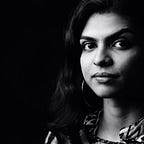What Writing Could Allow Words to Be Attached to Our Physicality?
Language could be seen as a means of relating — to another person, to our surroundings, or to the things we name with the word — in the present time. Of late I’ve found many things I read take away my attention from the page. And this has a lot to do with the form they’re written in.
I think reading is something physical, though we often see it more as a mental activity these days. In prose words run from one margin of the page to the other, so every line is the same length. So as I read, my eyes travel the same distance with each line before shifting to the next. Often after a couple of lines, I’m habituated to this pattern of movement my eyes need to make: left-right-shift-left-right-shift… With my body on autopilot, my mind is free to wander, to skip over words, to be somewhere else. I cannot tell you how many times I’ve read an entire page, only to realise at the end of it that I didn’t have a clue about what it said, because although my eyes were moving from one line to the next, I was thinking about something else.
Etymologically, prose means ‘straightforward’ (from the Latin prosa, proversus ‘turned to face forward’), which we associate with clarity or being direct, but could also mean it follows only one path — forward. And what about poetry? Does it have different possibilities? What we often associate with poetry is rhyme, metre, and form. But for me, these are the things that can actually take away from the writing when we look at it in the context of words and their meaning. For meaning is not only about definition, but also about how one word relates to another, to the page, and how you as a reader relate to the word and to the writer.
Personally I steered away from writing metric poetry for the longest time, because when I tried to follow a rhyme or metric scheme it would always sound forced. I often felt there was another word that would be better suited for what I wanted to say but couldn’t use because it didn’t follow the form — one that I had chosen before starting to write. Don’t get me wrong — there are a lot of poets who rhyme effortlessly and who incorporate structure into their writing in a way that is most natural. There are numerous writers of both prose and metric verse who are skilful in their use of words. And while I can value and admire this skill, I’m not talking about this at the moment. I’m talking about writing as a tool for exchange, not for creating objects or pieces that form exclusive canons of literature. I’m interested in knowing if writing can allow language to be an extension of life. Where the speaker (writer) is a part of a conversation just as much as the listener (reader), and the matter they speak about — where none of them have less importance than the other and nothing and no one is ever speaking alone. And perhaps this is difficult to conceive because our daily life is often made up of pre-rehearsed conversations and preconceived ideas in performative interactions; where we often are speaking alone even when we are talking to each other.
So, I’m thinking about a writing that could allow us to listen, that could allow us to share the experience of the word rather than only create or consume it. And for me the kind of writing that often comes closest to allowing this is free verse — one that is rid of all obligations to form or structure, where a word is free to move to another line before the line has reached the end of the page. One that is free to play with the space between words or between lines. And that necessitates your attention because it requires your presence to read. If we go to the roots of the words ‘poet’ and ‘poetry’, it comes from the Greek poiein ‘to make’. For me, this is much closer to what poetry could be. Reading, as making the text when we encounter each word.
For example, when I was writing about the habitual pattern of reading prose because of lines running between margins of the page, if I had written instead that my eyes move from
it would have been a different experience to read. I would need you as a reader to be present physically to travel that path of the words with me. Describing the same thing by saying our eyes move “left-right-shift-left-right-shift…” as I did before, is a more conceptual notion. You know what I’m talking about, but you don’t necessarily experience it as you understand it. And it is this physical presence that could allow us to share the word, and allow us to listen to ourselves rather than forget ourselves as we read.
